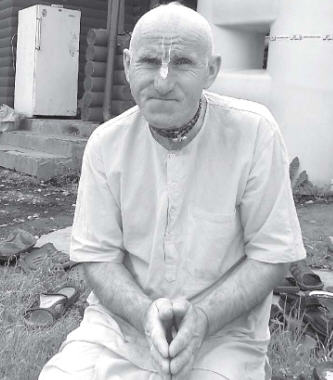A meeting with a Russian devotee helps the author
remove all misunderstandings about Muslims.

An ISKCON temple is located on the outskirts of Moscow, in a town named Eurolova. I stayed there for two weeks. One day, while giving the morning Srimad-Bhagavatam class, I quoted from both the Koran and the Bible. Devotees cheered me, giving me the “thumbs up” sign. They were elated to know that the Koran mentions that God has a form. Later we discussed how certain religious systems do not allow their followers to raise their level of consciousness. Names of popular figures came up during the discussion, and devotees expressed how Russia is full of mlecchas and yavanas (followers of non-Vedic principles, namely unrestricted meat-eating etc.). Little did I know that in just a few hours, a life-changing incident was to unfold.
Life-changing Incident
After my class I went down to the temple hall to see the Deities. I was surprised to see an old man in saffron robes (a brahmachari from the temple’s ashram) alone in the spacious hall, chanting and dancing. His fervent devotion touched my heart, and I tried to take his photo. He shied away, but I succeeded in the end. Still, it was clear he was embarrassed, so I left the room.
Four hours later I returned to the temple hall. That brahmachari was still there chanting and dancing. I was surprised. Not wanting to disturb him this time, I asked another temple resident about him. I was informed that the man was Amrta Gopala Dasa, a 55-year-old devotee who loves to chant and glorify Krishna. When he is at the temple he spends his whole day in kirtana. He also travels on the temple’s behalf. I learnt that for the last so many years he has been one of the most prolific distributors of Vedic literature in Russia he travels from Vladivostok to Siberia, selling books by the thousands. He goes out to sell books even in the winter, when temperatures fall to -20 or -30 degrees Celsius. I can barely conceive of such cold. I am from Mumbai, where the coldest it gets is +20.
A few devotees saw me listening to the glories of Amrta Gopala with rapt attention and became excited to both hear what was being said and add their own details. I learnt that Amrta Gopala doesn’t sleep at night. Instead, he chants japa throughout the night and sleeps between 5:00 am and 7:00 am. During the rest of the day he is busy with various services or his kirtana. He also sometimes does three-day fasts from food and water in order to save time for chanting the holy names. A younger devotee explained how the other night he wasn’t chanting in his usual place. Curious, this devotee searched for Amrta Gopala and was surprised to find him alone in the altar room (the place where the Deities are worshipped). Amrta Gopala’s face was wet with tears as he offered prayers to Krishna, indifferent to the world asleep around him.
Over the next two weeks, I heard one incredible story after another about Amrta Gopala and his devotion. I witnessed how he didn’t waste time gossiping or being frivolous. I also noticed him every day at arati coming forward to take the lamp and flowers offered to the Deity and, with the childlike enthusiasm of a new bhakta, offering them to the devotees.
Purifying My Material Vision
Near the end of my stay I got excited enough to run up to him. I hugged him tightly and exclaimed, “You are a Vaishnava! My life is a success because I have seen you!” Immediately he pulled away and tears gushed from his eyes. “You are a devotee from the sacred land of India. I am simply a worthless mleccha.” I gaped in disbelief as he condemned himself for being from a yavana background. The others then told me that Amrta Gopala Prabhu’s legal name is Albert Tariqq Abbassov, and that he was born in a conservative Muslim family in southern Russia. He continued to lament, “I have no devotion for Krishna. Please bless me that one day I develop attraction for chanting Krishna’s holy names.” I was humbled and inspired by his genuine, non-pretentious Vaishnava qualities. Over the next few days I embraced him daily, saying, “O Vaishnava!” And he responded each time, “No, Musalmaan, Musalmaan! You are a Vaishnava!”
Each time he said it, I felt pained at how wrongly I had understood Muslims. Here was a Vaishnava who defied all my conventional understanding of religion.
Praying to Namacarya Srila Haridasa Thakura, who was also born in a Muslim family but is considered the greatest devotee of Lord Caitanya Mahaprabhu, I desired to be free from my offensive mentality of judging people based on their external religious designation. It’s better to be born in a non-Vedic family and have genuine humility and devotion to Krishna than as a puffed-up hypocrite with no devotion, carrying the burden of material qualifications. My hope is that if one day I can sincerely appreciate Amrta Gopala Prabhu, I will be purified of my material vision.
